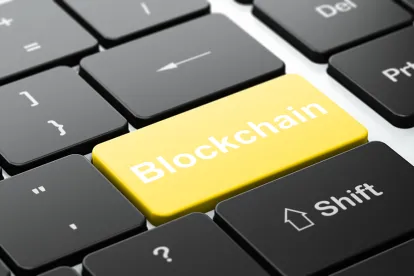The SEC Division of Corporate Finance recently issued a no-action letter to Pocketful of Quarters, confirming that the Division will not recommend any enforcement action if the company sells its blockchain-based tokens without registering them under the Securities Act of 1933 and the Securities and Exchange Act of 1934. This exciting determination is the second issuance of a no-action letter in the rapidly evolving the blockchain space.
IN DEPTH
On July 25, 2019, the Securities and Exchange Commission (the SEC) Division of Corporate Finance (the Division) issued a no-action letter (the PoQ Letter) to Pocketful of Quarters, Inc. (PoQ), confirming that the Division will not recommend any enforcement action if PoQ sells its blockchain-based cryptographically protected tokens—named Quarters—without registering such tokens under the Securities Act of 1933, as amended (the Securities Act), and the Securities and Exchange Act of 1934 (the Exchange Act. See the PoQ Letter here.
The PoQ no-action letter is the second no-action letter published by the Division with respect to the sale of blockchain-based digital assets or tokens. In April 2019 (in connection with its release of the digital framework), the Division issued a no-action letter (the TKJ Letter) to TurnKey Jet, Inc. (TKJ), advising that no enforcement action against TKJ under the Securities Act or the Exchange Act would be recommended by the Division in connection with the sale of TKY’s blockchain-based tokens. See the TKJ Letter here. And please find a link to McDermott’s discussion of the SEC’s digital framework and the TKJ Letter here.
Notably, both the PoQ Letter and the TKJ Letter are responses to proposals to sell and use blockchain tokens to solve a perceived payment systems problem specific to a particular industry. The TKJ tokens, as described to the Division in the letter submitted by TKJ (the TKJ Submission), are intended to streamline the mechanics of payment settlement for air charter services by allowing consumers to pre-purchase tokens that can be redeemed only to charter air transportation, thereby eliminating risks related to delays in payment or charge backs often associated with large financial transactions. PoQ’s Quarters, as described to the Division in the letter submitted by PoQ (the PoQ Submission), are intended to operate as a mechanism for the video game industry to allow those who play video games to transfer in-game purchased value across video game platforms. This would prevent the loss of gaming credits, coins or other units of account purchased or earned while playing video games.
As described to the SEC in the PoQ Submission, PoQ will offer an unlimited supply of Quarters to consumers at a fixed price. Quarters will not be tradable on a secondary market. As a result, according to the PoQ Submission, price appreciation for Quarters will not be possible. PoQ expects Quarters to be sold, or in some circumstances awarded, to gamers, who will only be able to use the Quarters for playing video games. The proceeds of the sale of Quarters, as explained in the PoQ Submission, will be invested in Ether via smart contracts. PoQ will assign designated wallets to video game developers and those who promote video games, described as influencers in the POQ Submission. The developers will be authorized by PoQ to exchange for Ether the Quarters that have been earned on their video games from game players and transferred to the specially designated wallets. Similarly, influencers who successfully market the use of Quarters by video game consumers will be awarded Quarters by PoQ.
“The Quarters Platform relies on blockchain technology to provide transparency and security,” PoQ’s lawyers wrote in the PoQ Submission. “The ability for all parties—games, [d]evelopers and [i]nfluencers— to view and audit all transactions is critical to gain the trust needed for large-scale adoption of a new gaming token accepted for use in multiple otherwise unrelated games.”
Critically, according to the PoQ Submission, video game players will have no ability to exchange their Quarters for Ether or any other digital asset. PoQ represented to the Division in the PoQ Submission that its sale documentation will state: “[b]y design, Quarters are not redeemable for [Ether] from the Quarters [s]mart [c]ontract by gamers and have no financial value for anyone other than [d]evelopers or [i]nfluencers with [a]pproved [a]ccounts.”
In arguing that Quarters are not securities, the PoQ Submission stated:
[N]o gamer, Developer or Influencer interacting with the Quarters Platform will reasonably expect any profit from purchasing or holding Quarters; rather gamers that purchase Quarters will simply use them for their consumptive purpose. Likewise, Developers and influencers will seek to acquire Quarters solely as payment for the Services they provide in connection with gameplay on the Quarters Platform. “[W]hen a purchaser is motivated by a desire to use or consume the item purchased,” rather than “the prospects of a return on investment… the securities laws do not apply.” United Housing Foundation, Inc. v. Forman, 421 U.S. 837, at 853-54 (1975)(citing to SEC v. Howey, 328 U.S. 293, 300 (1946))… Gamers will not be able to transfer Quarters to other addresses. Influencers will be prohibited from transferring Quarters other than to the Quarters Smart Contract in exchange for [Ether]. Developers will be prohibited from transferring Quarters other than in connection with Gamer Rewards and transfers to the Quarters Smart Contract in exchange for [Ether]. This will prevent Quarters from trading on a peer-to-peer basis or on any exchanges, preventing a secondary market for Quarters from developing, and eliminating any potential for financial gain as a result of reselling at a price higher than that paid for the Quarters. Accordingly, there is no profit potential under Howey. See PoQ Submission at 12.
We note that the PoQ Submission referenced a separate blockchain token, the Q2 Tokens, which will available on PoQ’s platform. The holders of Q2 Tokens, according to the PoQ Submission, will receive 15% of the proceeds from the sale of Quarters. The PoQ Submission took the position that Q2 Tokens are securities.
The Division’s conclusions in each of the PoQ Letter and the TKJ Letter are premised on several common assumptions regarding the purpose, functionality and marketing of the tokens:
-
The token platform will be operational at the time the tokens are sold and the proceeds of the sale of the tokens will not be used to develop the token platform.
-
The tokens will be immediately and continuously available to consumers for their intended use.
-
The tokens will not be able to be transferred outside of the platform created by, respectively, PoQ or TKJ (the tokens cannot be traded on an exchange).
-
The price of the tokens will not be expected to fluctuate.
-
The tokens will only be marketed as a means of consuming, respectively, video game or air-charter services.
The presence of these common assumptions indicate, as we suggested in April, that the Division’s operative policy is that the sale of virtual currencies that cannot be sold for a profit and that can only be used to purchase goods or services on an existing platform does not constitute an investment contract under the Supreme Court’s Howey test and, therefore, the sale and marketing of such virtual currencies are not subject to regulation under the Securities Act or the Exchange Act. See SEC v. Howey, 328 U.S. 293 (1946).
Under the Howey test, an investment contract exists where there is (1) an investment of money, (2) in a common enterprise (3) with a reasonable expectation of profits to be derived from the efforts of others. As argued in both the PoQ Submission and the TKJ Submission, the absence of an ability of consumers to realize a profit, and the expectation that the token can only be used to consume a service, prevents the third requirement of the Howey test— the existence of a reasonable expectation of profits to be derived from the efforts of others—from being met. This analysis is supported by SEC no-action letters, going back over 30 years, related to other kinds of prepaid services, such as prepaid tuition and prepaid funeral services. See Tuition Plan Consortium, LLP (February 4, 2003); Fleet National Bank (September 5, 1990); Michigan Funeral Directors Association (September 28, 1987).
The Division’s determination as to PoQ’s Quarters is helpful in that it provides another example of the application of the Howey test by the Division in the blockchain space. However, POQ’s reliance on the absence of an expectation of profit as the dispositive factor in reaching a determination that the sale of Quarters does not constitute an investment contract operates to limit the utility of the PoQ Letter for the majority of participants in the blockchain token industry.
To date, Bitcoin and Ether have avoided being characterized by the SEC as securities because the markets in which they are traded and the mechanisms with which they are used to settle transactions are sufficiently decentralized as to avoid being part of a common enterprise. Indeed, most users of Bitcoin and Ether openly participate in the market for these assets with an expectation of profit. See Digital Asset Transactions: When Howey Met Gary, William Hinman, Director, Division of Corporation Finance, Remarks at the Yahoo Finance All Markets Summit: Crypto (June 14, 2018).
It remains unclear whether the Division can be presented with facts under which it will issue a no-action letter for a new blockchain token where profits by purchasers are expected.





 />i
/>i